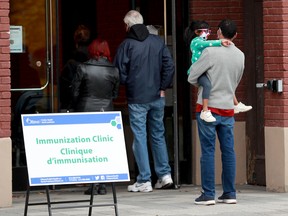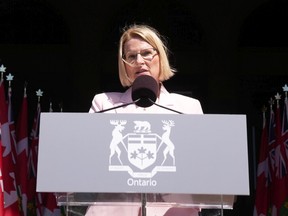Before the COVID-19 pandemic, the Ontario government had a plan to merge the provincial public health units from 35 to 10.

.
The new funding announced by Ontario’s health minister Wednesday will give public health units a respite as they continue to deal with the COVID-19 pandemic and try to return other programs to previous levels, the county said. Keith Egli, who chairs the Ottawa Board of Health, said Wednesday.
Announcement 2
.
“It gives us that space to focus on building back up and continuing to do what we need to do in COVID,” he said.
But the path forward for Ontario’s public health units remains uncertain.
At a time when the health system is reeling from a staffing crisis, some increasingly fear the province will introduce further privatization as a solution.

In her address to delegates from the Ontario Association of Municipalities, Health Minister Sylvia Jones warned that the status quo in health care was not sustainable. She is expected to describe the reforms on Thursday.
But it is not clear what changes are coming in public health units, which continue to bear the burden of the response to COVID-19.
Before the pandemic, the Ontario government had a plan to merge the provincial public health units from 35 to 10. Ottawa would become part of a much larger health unit that would stretch from the Quebec border to Kingston. Few details were made available, including staffing levels and where the new super unit would be based. The plan would leave the North with only two health units. The government also announced plans to reduce the provincial portion of health unit budgets.
Announcement 3
.
That planned restructuring was put on hold during the pandemic and the province has provided health units with “cost-sharing mitigation” ever since.
On Wednesday, Jones announced the cost-share mitigation would be extended through 2023 with an additional $47 million, saying it would provide “the financial stability needed to protect communities across the province.
“This will also ensure that it can continue to provide key services beyond COVID-19 efforts, such as childhood vaccinations and other public health inspections.”
Egli said the funding, which amounts to $3 million for Ottawa, would help stabilize the system and “recognizes that work needs to be done. It allows us to bring back full steam the things we do.”
Announcement 4
.

Ottawa Public Health, like other health units in Ontario, had to reduce or pause some programs during the pandemic in order to shift staff to work related to COVID-19.
With a new bivalent vaccine expected in the fall and more pandemic waves likely, Egli acknowledged the pandemic was far from over, calling the funding announced Wednesday a “very public acknowledgment” of that.
But while city officials at the annual conference, held in Ottawa, were relieved to hear the funding news, there was also anxiety about the direction the province would take when it came to public health.
During a panel discussion earlier this week, Egli said he and other panelists emphasized the importance of maintaining local public health. He called that a key lesson from the pandemic.
ad 5
.
While city representatives on the panel agreed there was plenty of room for collaboration between units, the connection between local public health and the City of Ottawa made it easier to find space for vaccine clinics, isolation centers and other needed spaces, Egli said.
“That was so much easier to do knowing the people at City Hall and having that connection.”
A round of consultations on the planned public health reform in the province has been halted due to the pandemic. Egli said consultations are needed if a major change in the way public health is delivered is coming.
Ottawa Public Health’s base budget, with costs shared with the Ministry of Health, is $66 million, a spokesman said. The province provides additional funding for some specific programs, including the Ontario Senior Dental Program.
The province’s COVID-19 response funding, which supports vaccination efforts, outbreak prevention and management, case and contact tracing, and medical notification, communications and consultation, is expected to double OPH’s budget in 2022.
-
‘There will be cuts’ to public health, warns health board chairman
-
Eastern Ontario rural health units say merging with Ottawa makes no sense
-
Ottawa board of health still awaiting details of province merger




